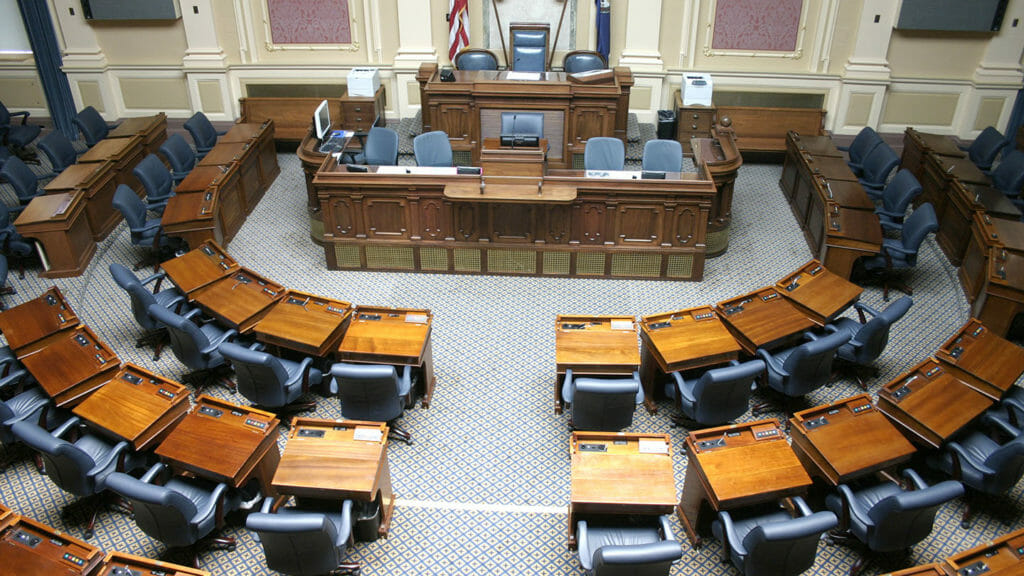
A state government advisory board is recommending that the Virginia General Assembly increase grant awards to cover assisted living costs, mandate sick leave and a living wage for direct care workers, and strengthen court review of benefit denials.
The Commonwealth Council on Aging, in its 2022 annual report with 2023 legislative recommendations, suggested enhancing assisted living community affordability through measures such as increasing the auxiliary grant rate and using Medicaid funding; increasing the Medicaid home- and community-based services waiver personal maintenance allowance; and mandating sick leave and a living wage for direct care workers in assisted living communities, HCBS care and nursing homes.
Raising assisted living grant rates
Many older adults and individuals with disabilities in Virginia have a difficult time finding a place in an assisted living community due to the state’s auxiliary grant program falling short on the real costs of care, the advisory board said. The auxiliary grants are available to recipients of Social Security supplemental security income and other residents of assisted living, adult foster care or other certified supportive housing.
In its report, the council wrote that funding for the grants is limited, especially compared to the growing need for affordable assisted living care. The 2022 monthly grant rate is $1,609, “which is far too low to cover the cost of services,” according to the council, which noted that the number of individuals receiving grants has declined over time, as have the number of participating providers due to the low grant rate.
According to Genworth’s Cost of Care Survey, the average monthly cost of assisted living in Virginia in 2021 was $5,250.
Virginia Assisted Living Association Executive Director Judy Hackler told McKnight’s Senior Living that she “absolutely” supports an increase to the auxiliary grant program to increase the availability of housing options for low-income older adults.
The state does not have a Medicaid waiver that allows for housing within an assisted living community, instead relying on the auxiliary grant program, which she said “does not come close to covering the cost of care.”
“Therefore, the number of assisted living communities that accept it have been declining,” Hackler said. “This decline, unfortunately, negatively impacts low-income seniors as it significantly limits their freedom of choice for housing, and ultimately results in individuals residing in environments that may be unsafe or not the best situation for them.”
Amy Hewett, vice president of strategy and communications for the Virginia Health Care Association / Virginia Center for Assisted Living, said that the association supports increases in the auxiliary grant program.
“Even with the modest increases in the auxiliary grant rate in recent years, the rate is still well below the monthly median cost of assisted living care in Virginia,” Hewett said. “Facilities have indicated that they would accept residents receiving auxiliary grant funds should rate be raised to a level that would cover the cost of care.”
A Joint Commission on Health Care study on the affordability of assisted living communities — directed by the state General Assembly and due out today — will examine challenges in the auxiliary grant program, as well as other avenues of funding for affordable assisted living, including Medicaid.
“Urgent action is needed to promote realistic options for Virginians who need assisted living care,” the council wrote, indicating that a 2023 legislative priority exists for the Alzheimer’s Disease and Related Disorders Commission, Northern Virginia Aging Network and the Virginia Poverty Law Center.
In addition, Virginia Medicaid’s monthly HCBS allowance is capped at $2,288.75, or 165% of Social Security’s supplemental security income. The council suggested raising the cap to 200% of SSI.
Medicaid HCBS waivers are designed to allow individuals who otherwise would qualify for nursing home or other institutional care to remain in the community (assisted living communities are not considered institutions). For 2022, the Virginia Medicaid HCBS personal maintenance monthly allowance is $2,288.75, which the council indicated may limit access to the program.
Improving direct care worker benefits
Another recommendation in the council’s report includes mandating sick leave and a living wage for direct care workers who work in assisted living communities, HCBS and nursing homes. The council called it “a major public health issue.”
“A growing number of states now protect at least some direct care workers through broader paid sick leave employment policies that vary in their requirements, but Virginia offers no such option,” the council wrote, adding that the average direct care worker in the state makes $27,338. The council recommended increasing Medicaid reimbursement rates to provide a living wage and other benefits.
Strengthen court review of benefit denials
Another recommendation affecting assisted living in the state involves strengthening the legal standards for court review of administrative appeals of agency public benefit decisions, including grants to pay for assisted living, Medicaid coverage and food stamps.
Individuals denied public benefits by an administrative agency have the right to appeal and have a court review the decision, but that review is limited to specific types of cases and whether the agency based its decision on the evidence before it.
The council proposed expanding the bases on which the court can overturn an administrative agency decision.




